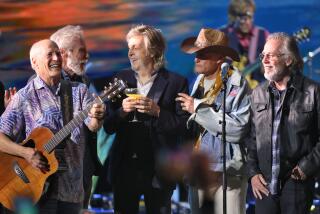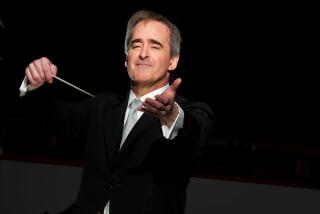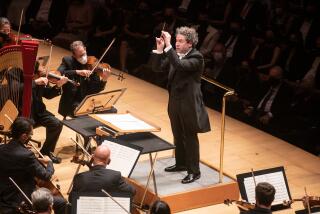Review: Dudamel marks his 10th L.A. Phil anniversary with a Hollywood Bowl blowout
The Los Angeles Philharmonic centennial celebration was the season of no no-brainers.
The new surpassed the old. Ambition overtook convention. Outreach mattered as much as tradition. Boundaries, of all sorts, were broken. Orchestral life got a shot in the arm. Classical music took on new meaning. Audiences expanded. The arts world en mass noticed. Critics turned enthusiasts. Yada, yada … yet it’s all true.
Now along with summer heat, mosquitoes and brainless movies comes the Hollywood Bowl, where no-brainers necessarily fund the revolution, where what has always sold still sells. A modicum of centennial innovation may have seeped into the Cahuenga Pass, but what felt really revolutionary at the Bowl on Thursday night during the celebration of Gustavo Dudamel’s 10th anniversary as L.A. Phil music director was the elevation of the no-brainer to a blissful art form of its own.
Called “Bravo Gustavo!” the evening honored surely the most widely beloved music director in any city. A giant selfie-friendly puppet of the conductor stood before the turnstiles to the amphitheater. Ushers handed out Dudamel lapel pins. Few of the 18,000 seats remained unoccupied.
That Dudamel adores the Bowl and the Bowl adores him right back is old news. When he was 24 and little known, he made his U.S. debut with the L.A. Phil at the Bowl in 2005 and got instant attention. His first act as music director in 2009 was a free Bowl concert, a sensation beamed around the world, in which he introduced L.A. to the newly formed Youth Orchestra Los Angeles, better known as YOLA, making music education in underserved communities his grand mission.
But Tuesday it was almost as if the Hollywood Bowl had a brain of its own for no-brainers.
The program included movie music from Hollywood’s so-called golden age and ended with a spectacular fireworks display of gold and silver splendor accompanying John Williams’ “Hooray for Hollywood” arrangement. The evening soloist was Khatia Buniatishvili, who was meant to play a Bowl ritual, Rachmaninoff’s Third Piano Concerto. But a shoulder injury forced her to make a last-minute change to Tchaikovsky’s First Piano Concerto, which then opened the program. Her virtuosity remained on prominent display, but the extra practice to work up the Rachmaninoff might have caused further muscle strain.
Popular as Rachmaninoff has long been at the Bowl, the Tchaikovsky concerto is something of a signature song for the venue. Meanwhile, it would be hard to find a pianist capable of hearkening back to the old days of Romanticism with quite the aplomb of this glamorous Georgian pianist. In her own way, Buniatishvili was as born for the Bowl as Dudamel.
She has her detractors, a great many, actually, for her shameless branding. The French call her “La Beyoncé du piano.” She has been compared to Marilyn Monroe in the way she has marketed her figure in fashion shoots and her gowns onstage. She has promoted her emoting in videos that have made her the laughingstock of sophisticates. At her youthful, self-absorbed worst, she can be pretty hard to take seriously.
But it has been just as hard not to take her seriously. She is an extraordinary pianist with a magnificent technique, an inherent musicality and, whatever you might think of it, a genuine musical personality. At 32, she’s toned down the excess of showy pianistic passion.
At the Bowl, she seemed less a Vogue cover girl than maybe someone who belonged on the cover of “Anna Karenina,” a pianist playing classic Tchaikovsky straight out of a classic Russian novel. She was extreme. Fast meant impulsive. The lyrical slow passages of the first movement were moments of expansive reverie. Tchaikovsky noted the second movement “Andante simplice”; it was here neither moderate nor simple, unless that is all it takes for you to enter into a trance. In the big cadenzas she was stunning, so effortless that the piano appeared to play itself, as she flicked her hair and mugged just the right amount for the video screens. The result offered a feast of Tchaikovsky old-wine-in-new-bottles, the kind of playing far more common at the Bowl back in Hollywood’s golden age.
Dudamel proved her perfect Tchaikovsky companion, enthusiastically backing her up in everything. He was then the perfect film buff, bringing to old movie scores the sense of grandeur of the big screen.
The orchestra was very large. In a Korngold march from “The Adventures of Robin Hood,” a suite from Bernard Herrmann’s score to “Vertigo” and another from Max Steiner’s to “Casablanca,” Dudamel emphasized orchestral boldness, big emotions and the urge to thrill that might have all just emerged from the Tchaikovsky performance.
He brought out members of YOLA to join the L.A. Phil in a Franz Waxman suite from “Sunset Boulevard” and the grooviest performance of Henry Mancini’s “The Pink Panther” theme probably ever. Ten years ago, the YOLA kids were enthusiastic beginners in a young experimental program. This generation now amazingly holds its own.
Finally, Williams’ “Raiders of the Lost Ark” raided from pop culture for the purposes of epic symphonic glory.
In his casual remarks to the audience, Dudamel called the L.A. Phil the greatest orchestra in the world, just as he’s supposed to. The rest of the world, however impressed by the orchestra’s ambition, does not buy that.
A month earlier, however, Dudamel had the prestigious honor of conducting, for the second time, the Vienna Philharmonic’s annual outdoor “Summer Night Concert.” The recording has just been released, and the “Casablanca” Suite is on it. There are also other works by Gershwin and Dvorák that Dudamel has conducted with the L.A. Phil.
For the rest of the world, it is a no-brainer that the Vienna Philharmonic, not the L.A. Phil, is the one of the two or three greatest orchestras in the world. The L.A. Phil is not one of the 10 nominees for Gramophone magazine’s orchestra of the year. Anyone who was at the Bowl on Tuesday and then listens to the new recording out of Vienna will know no-brainers are not always what they seem.
More to Read
The biggest entertainment stories
Get our big stories about Hollywood, film, television, music, arts, culture and more right in your inbox as soon as they publish.
You may occasionally receive promotional content from the Los Angeles Times.







